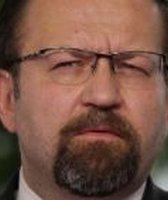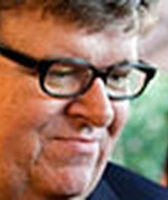Stand up for the facts!
Our only agenda is to publish the truth so you can be an informed participant in democracy.
We need your help.
I would like to contribute
David Jolly says he 'never lobbied for offshore oil drilling'
Congressional hopeful David Jolly’s lobbyist past is a major target for his opponents. His response to an accusation that he lobbied for expanded offshore oil drilling is problematic for the Indian Shores Republican, however.
Jolly was at a Tampa Bay Beaches Chamber of Commerce forum on Jan. 6 when he said he supported the current restriction preventing drilling within 230 miles of Florida’s coastline.
An audience member said there was talk that Jolly lobbied on behalf of oil-drilling interests, which Jolly refuted.
"I have never lobbied for offshore oil drilling, and I'd be interested in what information you might be suggesting because that's never happened," Jolly said. "I'm not suggesting you are fabricating this, but if that information is in the public domain, it's a complete fabrication."
So has Jolly lobbied for expanded oil exploration, despite saying he opposes drilling now? Time for PolitiFact Florida to go back to the well.
Digging deep
The Democratic Congressional Campaign Committee seized upon the incident at the forum. In a post on their website later that day, the group declared, "In 2011 Jolly lobbied on behalf of Free Enterprise Nation for the Roadmap for America’s Energy Future."
It tied Jolly and his Three Bridges Advisors lobbying firm to Free Enterprise Nation, a pro-business, anti-regulation advocacy group. It also showed that Free Enterprise Nation supported the Roadmap for America’s Energy Future, an energy independence proposal introduced by Rep. Devin Nunes, R-Calif., as H.R. 909 on March 3, 2011.
The DCCC quoted a Weekly Standard article saying the Roadmap "would open the Outer Continental Shelf to offshore drilling." They also cited then-Assistant Secretary of Energy David Sandalow as saying the bill would thwart "safety and environmental reforms adopted in the wake of the Deepwater Horizon oil spill."
The Roadmap, meanwhile, was referred to the Energy and Commerce committee, which held a hearing on June 3, 2011 (the day Sandalow testified), but no further action was ever taken.
Offshore drilling is not allowed off Florida shores, for the most part. Florida is protected by the 2006 Gulf of Mexico Energy Security Act, which prohibits drilling within 230 miles of Tampa Bay and 125 miles from the Panhandle. The law expires in 2022. President Barack Obama banned drilling in the Eastern Gulf of Mexico for seven years following the 2010 disaster. The Bureau of Ocean Energy Management announced in December that 465,000 acres extending as far east as Pensacola would be leased for drilling in March.
We found a lobbyist disclosure that showed Jolly did work with Free Enterprise Nation in the first quarter of 2011, and Jolly himself wrote an April 2011 blog post on the group’s website that noted Free Enterprise Nation was in favor of the Nunes bill.
Jolly responded to the DCCC’s attack by once again saying the assertion wasn’t true, and that he remained "unequivocal in that statement." But he also said that "a later review of public documents did reveal that a former client of mine endorsed a comprehensive energy independence blueprint that could have possibly expanded drilling in the Gulf, but I did not lobby on its behalf." He added he did support offshore drilling outside the 230-mile moratorium area.
Free Enterprise Nation founder and former CEO Jim MacDougald issued his own statement. "While FEN did publicly support the Roadmap for America’s Energy Future, David Jolly was never employed to advocate on its behalf," MacDougald said. "David represented FEN on issues related to transparency for public employee pension funds, right-to-work matters, and a reduction in corporate and individual taxes." MacDougald is now Jolly’s campaign finance co-chairman.
It’s not the first time Jolly’s platform and his past have come under scrutiny: Kathleen Peters, his rival in the Jan. 14 Republican primary, previously accused him of lobbying for the Affordable Care Act. We found that statement False, because he had a plausible explanation (not to mention the client backing up his claims) and Peters’ camp couldn’t prove its case.
On the lobbyist disclosure form, Jolly lists the Nunes bill as a subject of his activity. He said he listed the proposal not because he lobbied for the bill, but because he had attended a meeting in which the legislation was discussed. He said he "had a practice of always overcomplying."
Public Citizen Congress Watch Division director Lisa Gilbert said it would be extremely uncommon for any lobbyist to overreport what their work entailed. She added that the forms are designed in a way that a lobbyist has to individually report what they deal with.
"It would be very surprising to me if he wasn’t, in his mind, working on this legislation when he filled out the form," she said.
Dan Auble, a lobbying researcher at the Center for Responsive Politics, said that according to the guidelines of the Lobbying Disclosure Act, lobbyists are supposed to report any issue in which they played a specific action. This can include preparing information, communicating with government officials, participating in planning activities and other actions on behalf of the client.
Auble warned that the filings are fairly vague, and that we can’t independently verify the kind of activity that led Jolly to list H.R. 909. But according to the Lobbying Disclosure Act, even being in a meeting in which it was discussed was technically a form of lobbying.
"He was part of a communication about the bill," Auble said. "Essentially, that’s why he put it on the form."
Our ruling
Jolly said he never lobbied for offshore drilling. But a lobbyist disclosure statement contradicts that, and Jolly said later that he did attend a meeting in which the legislation was discussed even though he didn’t actively lobby for it. When we looked into the rules of lobbying, it seems that the situation as he describes it -- being at a meeting but not actively pushing the measure with elected officials -- technically counts as being part of a communication about the proposal.
We’ll never know the specifics of the meeting in question, and given the vague nature of lobbying reporting, the events may very well have been as low-key as he describes. But when it comes to the letter of the law, the way Jolly describes the incident counts as lobbying, experts say.
We rate this statement Mostly False.
Our Sources
Tampa Bay Times Buzz blog, "For these Republican candidates, offshore drilling is taboo," Jan. 6, 2013
Tampa Bay Times, "Candidate Jolly says he did not lobby for oil bill, despite document that says he did," Jan. 10, 2014
DCCC, "Shot/Chaser: David Jolly caught in a lie," Jan. 6, 2014
PolitiFact Florida, "Kathleen Peters says David Jolly was 'lobbying for government-run health care' in 2012," Jan. 6, 2014
New Orleans Times-Picayune, "Eastern Gulf of Mexico lease sale to open 465,000 acres for drilling," Dec. 3, 2014
CNN, "Obama bans eastern Gulf drilling for 7 years," Dec. 1, 2010
PolitiFact, "Sen. Bill Nelson says offshore drilling won't pay for Florida schools," June 15, 2009
Free Enterprise Nation, "Rising Gas Prices to Force Congressional Debate," April 25, 2011
Bureau of Ocean Energy Management, "Gulf of Mexico Energy Security Act (GOMESA)," accessed Jan. 10, 2014
Collins Center for Public Policy, "Potential Impacts of Oil and Gas Explorations in the Gulf," April 2010
U. S. House of Representatives, "Statement of Assistant Secretary David Sandalow," June 3, 2011
U.S. House of Representatives, Legislative Resource Center LD-2 Disclosure Form, accessed Jan. 8, 2014
OpenSecrets.org, Free Enterprise Nation 2011 lobbying spending summary, accessed Jan. 10, 2014
The Weekly Standard, "The Roadmap for America's Energy Future," March 2, 2011
The Weekly Standard, "Summary of the Energy Roadmap," March 2, 2011
The Free Enterprise Nation, "Rising Gas Prices to Force Congressional Debate," April 25, 2011
WMNF, "David Jolly tells Pinellas voters he didn't lobby for offshore oil drilling; DCCC accuses him of lying," Jan. 7, 2014
U.S. House of Representatives, Lobbying Disclosure Act Guidance Sec. 3, Definitions, accessed jan. 10, 2014
U.S. Senate, Lobbying Disclosure Act Sec. 3, Definitions, accessed Jan. 10, 2014
Interview with Sarah Bascom, David Jolly spokeswoman, Jan. 8, 2014
Interview with Dan Auble, Center for Responsive Politics lobbying researcher, Jan. 10, 2014
Interview with Lisa Gilbert, Public Citizen Congress Watch Division director, Jan. 10, 2014
Browse the Truth-O-Meter
More by Joshua Gillin
David Jolly says he 'never lobbied for offshore oil drilling'
Support independent fact-checking.
Become a member!
In a world of wild talk and fake news, help us stand up for the facts.






































